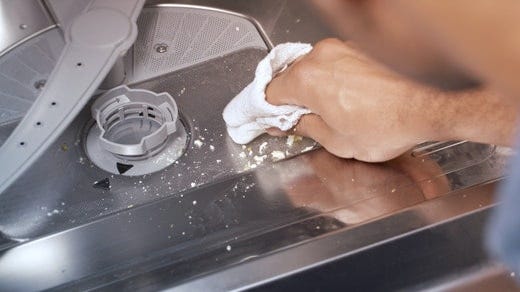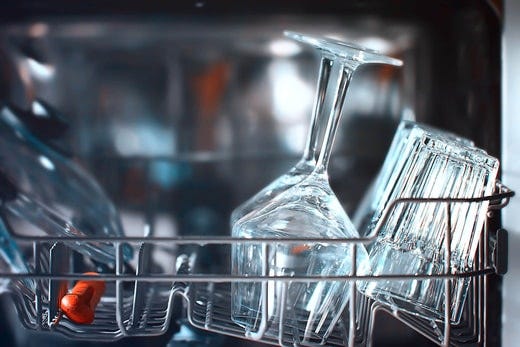
How to clean glass in the dishwasher
From those annoying cloudy stains on your glasses to how to get your glassware sparkling, here’s our guide to cleaning glass in the dishwasher.

Glassware can be some of the most frequently used items in the household, and as a result, some of the most often washed in the dishwasher. However, repeated washing and high temperatures can cause glasses to become cloudy.
There are two main causes of cloudy glassware, and both tend to happen over time. The first is due to hard water deposits, and the other is caused by corrosion. These two different types of clouding require different precautions to prevent them from happening when cleaning glass baking dishes or drinking glasses.
Try Finish Ultimate Pro Material Care for our ultimate clean and diamond shine first time every time. Its advanced chemistry is effective at breaking down all types of food residues, even stubborn 24h dried-on stains, without pre-rinsing. The tabs help protect and care for your glassware and cutlery, maintaining their shine wash after wash and also contain boosted glass care agents*. Our ultimate performance with 15% less chemical weight than Finish's traditional pressed powder tablets^.
^vs. Finish Power All in One
*Contains agents known to help protect glasses against corrosion and clouding. This product does not protect from mechanical damage or restore already damaged items
Cloudy glass & hard water deposits
If you live in a hard water area, you may be faced with mineral deposits gathering in your dishwasher. Hard water can be problematic for dishwashers, as the minerals in the water can appear as cloudy marks on glasses and dishes. These deposits, such as limescale, can cling onto your glassware and dishes, causing white spots or clouding. To help combat the problems driven by hard water, such as limescale, we recommend keeping Rinse Aid topped up in your dishwasher. It will help protect your glasses further, ensuring brilliant shine.
What can you do to prevent cloudy glasses?
Fortunately, to help reduce this sort of glass clouding, we recommend the below tips:
- Give your dishwasher a regular, thorough clean with Finish Dishwasher Cleaner to help remove the nasty debris that can get left behind after a wash, like grease and limescale – before it can cling to your glassware.
- Add Finish Rinse Aid to your cycle to help ensure that water droplets that form on surfaces are dispersed before they can evaporate and leave behind any residue.
- Adjust the temperature of the dishwasher or try using a different dishwasher cycle. Some dishwashers have a glassware setting, or you can manually adjust the temperature to bring your wash onto a lower temperature cycle. This gentler cycle may help reduce clouding.
Glass corrosion
If you’re living in a soft water area then you’re particularly at risk of corrosion, another kind of glassware clouding, but it can happen anywhere.
How to help prevent glass corrosion in your dishwasher
There are a number of ways to help reduce cloudy glasses in your dishwasher, and it’s important to get it right before the irreversible effects of corrosion occur:
- When buying glassware, ensure they are dishwasher safe.
- Use a dishwasher detergent like Finish Ultimate Pro All in 1 for our ultimate shine.
- For more delicate glassware, wash at a low temperature, or on a glass washing setting.
- Once your dishwasher cycle has finished, open the dishwasher to allow excess steam to escape. Modern machines take care of this with internal fans. Allow your glassware to cool in the dishwasher before removing them.
How to clean drinking glasses in the dishwasher
Every day we use and reuse glasses over and over again, but with every wash, your glasses can go cloudy. Take a look at some of our top tips below for helping your glasses sparkle out of the dishwasher.
- Load your glasses onto the top rack, away from any other dishes.
- We recommend to use Finish Rinse Aid to help reduce watermarks appearing on your glasses, as well as preventing extra washing and wiping after your dishwashing cycle has finished.
How to clean wine glasses in the dishwasher
Cleaning wine glasses in the dishwasher can be perfectly safe – as long as you are careful about how you load your machine.
- Ensure that your glasses are safe for your dishwasher
- If possible, load your wine glasses on the top rack - you may have to lower the rack to make space. Make sure they’re not touching each other, as this could cause them to crack as they knock together.
- Many modern dishwashers have a delicate or glassware setting. The lower temperature and gentler jets are ideal for washing wine glasses.
- We recommend adding Finish Rinse Aid to help fight water spots and cloudy glasses.
- Use a dishwasher detergent like Finish Ultimate Pro Material Care for our ultimate clean and diamond shine first time every time.
So, there you have it, just a few simple things to keep in mind when looking after your glasses to ensure that they stay looking shinier for longer.


